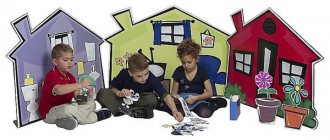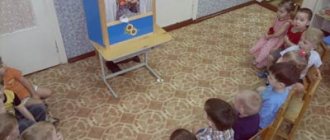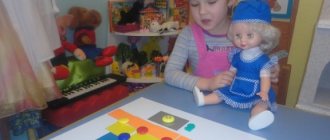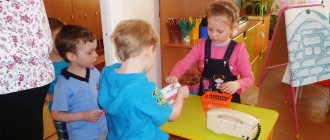Speech development in children's play activities
Speech development in children's play activities
Research by scientists has proven that only through speech does development occur: memory, attention, imagination and logical abilities. The fundamental basis for successful learning at school is properly developed speech.
Preschool age is a fertile time for speech development. To become highly educated, a person must master all the riches of his native language. And for us educators this is the main and initial task.
The main activity of preschool children is play. During the game, children study not only the world around them, but also themselves, their place in the world. Play is not only entertainment, but also a child’s creative work; this is where he begins his life. Therefore, the role of play in the development of speech in preschool children occupies a leading place.
In our work, we use games to develop children's speech. Thanks to their use, the learning process takes place in a playful form that is accessible and attractive to preschool children. Through play, we develop children’s speech: we replenish and activate their vocabulary, form correct sound pronunciation, develop coherent speech, and the ability to correctly express their thoughts. In addition, playing GCD and during restricted periods helps reduce mental and physical stress.
The main goal of our work is to develop all components of children's oral speech through play. After all, preschool age is the age of active speech development. Non-interference in this process may result in a delay in the child’s development.
Each game also solves educational problems. Children develop a culture of verbal communication in the broad sense of this concept, moral feelings and qualities, and ethical ideas are formed.
In our work we use various games: role-playing, didactic, theatrical, moving, finger games.
We assign a special role to didactic games, which are divided into: verbal, with toys and objects, and board-printed.
We select such game options to arouse children's interest in word games. In all educational activities and routine moments we include didactic speech games and entertaining exercises: phonetic, lexical, grammatical, games with words and movement. In order for children to show interest in a game again, we pay attention to how to finish the game. We give away forfeits, honor the winners, announce a new version of a familiar game, etc.
Experience shows that it is necessary to devote enough time to the sound perception of words, to form the child’s phonetic and speech hearing. To develop the phonetic-phonemic side of speech, we conduct the following games:
for example, like
“Let's play a fairy tale”, “Broken telephone”, “Traffic light”, “Repeat”
, where you need to find a picture and clearly pronounce the sound combination, correctly convey the sound of the word to your neighbor, choose a word that is not similar in sound composition to the other three and etc.
Cartoons, games on computers, smartphones, tablets. Influence on the child's speech.
Nowadays, you can quite often find children 2-3 years old who not only don’t speak, but also don’t respond to their own name, but in 20 seconds they can connect to the Internet on someone else’s phone to play with toys. How this delights adults: “He’s so smart! He plays educational games!”
What development do parents expect their child to achieve from tablet games? Understanding of speech, development of vocabulary, thinking functions (comparison, generalization, exclusion), attention, memory - that is, what is usually taught in kindergartens.
I watched how children played these tablet games and what they learned. I found out. They learn to move their finger well and remember the necessary images. See for yourself. The child cannot read the task of the game, he cannot even understand the task that is voiced by the voice-over. He tries to solve the problem “at random”, i.e. moves one element, if it does not fall into place, selects another element, third, fifth... Finally, he got it. Let's try the next one. Repeat the same actions. If he plays the same game again, he will start doing the same actions again. Over time, the child will simply remember the sequence of actions leading to the correct result. Please note that the child never thought; he remembered the correct sequence of actions. What did the child develop as a result? - Motor function of the finger.
Games on tablets and smartphones do not develop the emotional-volitional sphere of the child. Although the point of any game, to win or not to lose, is to achieve the goal by the means specified in the rules. Children have little experience of success and disappointment, so they do not strive for victory and do not rejoice in it, but simply poke at buttons. We think that over time the child will begin to understand the meaning of the game, but the opposite process occurs. At first he tries to play one game, then he plays it less and less and downloads other games more and more often. After a while, you will notice that in a week the child has downloaded dozens of games, playing each of them for only a few minutes. And in the end, children addicted to gadgets begin to watch streams, that is, videos of how other players play. The result is time wasted, the brain is empty.
There is one more feature in cartoons and gadgets - the large number of people involved in this process. And we often think – all the children are watching, so it’s useful. Moreover, many experts are influenced by mass opinion. Although in speech therapy at universities there is not a word in any subject about the benefits of computer games and cartoons.
The benefits of pictures, reading books, and real games for speech development are enormous, and are studied in detail in speech therapy and pedagogy (one of the basic principles of pedagogy is the principle of clarity); there are clear standards and requirements for the quality of didactic visual material.
At the same time, even in the old speech therapy, attention was paid to training using new technologies. For example, in the orders (more than 30 years ago) on the equipment of a speech therapy room there were requirements for a TV, video and audio tape recorders. But the goal was not to show this to children - the goal was to show parents and other professionals how the classes were conducted.
If we ignore the harm that watching cartoons and uncontrolled games on tablets cause to a child’s physiology, the question remains - why don’t these “developmental” things develop the child? The point is the lack of human-human or even human-machine feedback. Here the child is not required to consciously act; he does not receive an emotional reaction or evaluation of his actions. And from live communication (or communication via video communication), the child immediately receives an emotional reaction to his actions from an adult (parent or teacher) on the other side, regardless of whether in real life or via Skype.
What to do? Abandon modern technologies completely? No. You just need to use them wisely.
MAGAZINE Preschooler.RF
Article on the topic “The influence of didactic games on the development of speech activity of older preschool children”Authors:
- Pashkova Anastasia Ivanovna
- Kotlyar Olesya Viktorovna
Teachers of MBDOU "Kindergarten of a combined type "Yolochka" Republic of Khakassia, Abakan city
Preschool childhood is a short but important period in the formation and development of a child. The main activity of preschool children is play, during which the child’s spiritual and physical strength develops; his attention, memory, imagination, discipline, dexterity. In addition, play is a unique way of learning social experience, characteristic of preschool age. All aspects of the child’s personality are formed in it, significant changes occur in his psyche, preparing the transition to a new, higher stage of development.
In our work we pay special attention to didactic games. Thanks to its use, the learning process takes place in a playful form that is accessible and attractive to preschool children. The didactic game develops children’s speech: it replenishes and activates the vocabulary, forms correct sound pronunciation, develops coherent speech, and the ability to correctly express one’s thoughts.
The main goal of our work is to develop all components of children's oral speech through didactic games. After all, preschool age is the age of active development of speech, mastery of correct sound pronunciation, and the formation of coherent speech. Non-interference in this process may result in a delay in the child’s development. The timely development of a child’s speech in preschool age contributes to further successful learning at school.
The structure of didactic games for speech development is determined by the principle of interconnection between various sections of speech work, which creates the prerequisites for the most effective acquisition of speech skills. In addition, playing during classes and during restricted periods helps reduce mental and physical stress.
Each game also solves educational problems. Children develop a culture of verbal communication in the broad sense of this concept, moral feelings and qualities, and ethical ideas are formed.
Undoubtedly, didactic games are a powerful tool for the development of speech in children also because they can be recommended for use by parents at home. Conducting didactic games does not require special knowledge from them in the field of pedagogical sciences and large expenses in preparing the game.
In our work we use various didactic games: verbal, with toys and objects, board-printed.
One of the main tasks is to choose such game options to arouse children’s interest in word games. In all classes and routine moments we include speech didactic games and entertaining exercises: phonetic, lexical, grammatical, games with words and movement. In order for children to show interest in a game again, it is very important to pay attention to how to finish the game. This could be playing forfeits, honoring winners, announcing a new version of a familiar game, etc.
We begin some games and activities with children with articulation exercises, pronouncing all kinds of tongue twisters, tongue twisters, rhyming lines for the development of the speech apparatus.
Experience shows that it is necessary to devote enough time to the sound perception of words, to form the child’s phonetic and speech hearing. To develop the phonetic-phonemic side of speech, we play games such as “Let’s Play a Fairy Tale” , “Broken Phone” , “Traffic Light” , “Repeat” , where you need to find a picture and clearly pronounce a sound combination, correctly convey the sound of a word to a neighbor, choose a word , which is not similar in sound composition to the other three, etc.
In addition, familiarity with the sound side of a word fosters interest in the native language. It is important for us that children, when they become schoolchildren, lovingly study their native language as a subject, the comprehension of which spiritually enriches a person.
One of the areas of our work is to expand and enrich children's vocabulary with different forms of speech, synonyms, antonyms, and generalizing words. To do this, we use lexical and grammatical games, for example, “Name three words” , “Who wants to become who?” (using difficult verb forms), “What do you see around you?” (using the names of objects), “Tell me which one?” (selection of adjectives).
For older children, we often select games in which children learn to express their thoughts coherently and consistently and speak expressively. I often entrust the role of the leader in games to one of the participants who are more independent in choosing didactic games, organizing the environment, and selecting play partners. In the process of explaining the rules of the game, evaluating the answers and statements of peers, children learn to use complex sentences in speech, to use direct and indirect speech.
Word games like "Zoo" , "Is this true or not?" , “Make a description” , “Come up with the ending of a fairy tale” teach children to retell, independently compose stories according to a model according to a diagram, according to a plot picture, according to a set of pictures, from personal experience; write endings to fairy tales, solve riddles.
All children love riddles and enthusiastically try to solve them. That's why we offer children games where they need to solve various riddles. And it doesn’t matter at all that some of them cannot be guessed by children on their own. After all, the main thing about riddles is that they develop imagination, help master the ability to characterize someone or something, and form a quick reaction to a word.
Preschool age is a fertile time for speech development. To become highly educated, a person must master all the riches of his native language. And for us educators this is the main and initial task.
| Next > |
Speech development through play: practical advice for parents
In order for speech development through games to be carried out correctly and effectively , it will be useful for parents to familiarize themselves with the following practical tips:
- Every parent should remember that a child primarily learns language and speech by listening, observing, exploring, copying, responding, playing and interacting with the people around him. Therefore, it is very important not to use profanity or filler words in everyday life with a child, and not to distort words, “lisping” with the baby. You need to speak to him clearly and with intonation, trying to pronounce words correctly, emphasizing the right syllables. Hearing correct and clear speech from early childhood, the child in the future, without realizing it, will speak the same way;
- Eliminate television from your child’s daily entertainment. Of course, there are many children's television programs aimed at teaching a child, but this method of learning is passive and does not involve human interaction. Many studies show that children who watch too much television in the early years of life have difficulty concentrating and being obedient when they reach school age. It is much better to pay more attention to the child and work together with him to develop speech through games;
- If a child switches early from breastfeeding to bottle feeding and becomes addicted to a pacifier or nipple, then you should not put off stopping their use. Constant use of a pacifier inhibits the development of a baby’s speech, because it closes his mouth, preventing him from making sounds and trying to speak;
- Many parents underestimate the role of games in the development of a child’s speech, especially in infancy, which is a big omission. The sooner they begin to work with the child on speech development, the better the results will be in the future;
- Parents need to take part in the child's daily games, commenting on them. If, for example, a child is playing shopping with his toys or having a tea party, you need to constantly comment on him and your actions, ask the baby what this or that toy does;
- It is important not to ask the child too many questions during games, otherwise he will feel constant pressure from the parent and will quickly lose interest in games with elders;
- It is necessary to develop a unified focus with the child when developing speech through games. It is important to pay attention to what interests the child - to any objects on which he concentrates his attention - and to use these objects during educational games, commenting on their appearance and properties. This helps create a common focus with the baby and shows him that he and his parents have the same interests;
- Many children love going to supermarkets where they can ride in grocery carts. You can use this passion in the development of speech, drawing the child’s attention to hundreds of names of products presented on the shelves;
- Once a week you can play with your child at home. This will help develop his imagination, and memorizing lines and poems will develop the child's memory and speech.
The influence of play on the overall development of a child
Gaming activity influences the formation of arbitrariness of mental processes. Through play, children begin to develop voluntary attention and voluntary memory. When playing, children concentrate better and remember more.
The gaming situation and actions in it have a constant influence on the development of the child’s mental activity. In the game, the child learns to act with objects as substitutes; he gives them game names and acts with them in accordance with the name.
The substitute object becomes a support for thinking. Thus, the game affects thought processes. Role-playing play is crucial for the development of imagination.
The influence of the game on personality development
The child’s role is that through it he gets acquainted with the behavior and relationships of adults, who become a model for his own behavior; in the game, the child acquires basic communication skills.
The influence of games on speech development.
The game has a great influence on the development of speech. The game situation requires from each child included in it a certain level of development of verbal communication.
If a child does not know how to express his wishes regarding the course of the game, if he is not able to understand the verbal instructions of his playmates, then he will be a burden to his peers. Play as a leading activity is of particular importance for the development of the sign function of a child’s speech. In the game, the development of the sign function is carried out through the replacement of some objects with others.
Substitute objects act as signs of absent objects. Naming an absent object and its substitute with the same word concentrates the child’s attention on certain properties of the object, which are conceptualized in a new way through substitution.
Reflection.
Play as a leading activity is of particular importance for the development of reflexive thinking. Reflection is a person’s ability to analyze his own actions, actions, motives, and correlate them with universal human values, as well as the actions, actions, motives of other people. Reflection contributes to adequate human behavior in the world of people. The game leads to the development of reflection, since in the game there is a real opportunity to control how the action involved in the communication process is performed.
The emergence of new activities.
The game also develops other types of child activity, which then acquire independent significance. Thus, productive activities (drawing, design) are initially closely related to play. While drawing, the child acts out this or that plot.
The construction of cubes is woven into the course of the game. Only by older preschool age does the result of productive activity acquire independent significance. Also, within the gaming activity, educational activity begins to take shape, which later becomes the leading activity. A preschooler begins to learn by playing; he treats learning as a kind of role-playing game, with certain rules.
Game as a means of education.
In the pedagogical theory of play, special attention is paid to the study of play as a means of education. Education is the process of developing the qualities of a person’s personality. The fundamental position is that in preschool age play is the type of activity in which a personality is formed and its internal content is enriched. N.K. Krupskaya emphasized the polar influence of play on a child’s development, depending on the content of the activity: through play you can raise a beast, or you can raise a wonderful person needed by society. Numerous psychological and pedagogical studies have convincingly proven that the child’s diversified development occurs in play. A toy also becomes the most important means of education, forming an idea of the world and developing taste and moral feelings.
Speech development through role-playing game
In order to develop a child’s sense of his native language on an instinctive level, the ability to pronounce words correctly and easily assimilate the grammatical norms of his native language, various role-playing games can help the child. Such games will allow the child to master a new amount of knowledge, show initiative and creative activity, and solve mental problems in a playful way, which will help overcome difficulties with coherent speech.
This development of speech through the game gives participants the opportunity to navigate real life situations , pretend and repeatedly play them in their fictional world, develop an active attitude towards life, gives determination in achieving their goals and ultimately helps the formation of coherent speech.
Development of children's speech through games for fine motor skills
Fine motor skills are understood as a set of coordinated actions of the human muscular, skeletal and nervous systems, often in combination with the visual system, aimed at performing precise and small movements of the fingers and hands. The simplest movements that can serve as examples of fine motor skills are tying shoelaces, knitting, modeling, etc. Scientists have proven that close to the speech zone in the cerebral cortex there is a projection of the hand, which means that the development of fine motor skills directly affects the development of speech.
For very young children, speech development through games can be accomplished through finger games , which develop both fine motor skills and the child’s speech at the same time. An example of such games are various nursery rhymes, such as “Magpie-Crow” or “Ladushki”. The baby will not only move his fingers, helping and repeating various movements after his parents, but also try to repeat various sounds and words. The development of speech through games aimed at developing fine motor skills can also be achieved by massaging the baby’s hands and fingers. Modeling, puzzles, mosaics, games with small objects (beads), construction sets, etc. perfectly develop a child’s fine motor skills.
Unfortunately, many parents lead an active lifestyle, work a lot and do not have the opportunity to spend enough time with their children. Such development of children's speech through games for the development of fine motor skills will not take much time: with very young children under 3 years old, a session of one game should not exceed 25-30 minutes.
Didactic games for speech development in older preschoolers
In the sixth year of life, the development of speech in preschool children progresses noticeably, and it becomes more complex structurally. But, despite the significant expansion of vocabulary, the preschooler is still far from fluently using words. Games for speech development are often practiced in the older group if the child attends kindergarten. At home, parents must initiate them. Didactic games are suitable for speech development in older children.
1. “What comes first, what comes next” – helps children learn to write stories. The child is offered any picture with a plot. He must think and tell what happened at the beginning of this story, in the middle (picture) and how it all ended.
2. “A fairy tale with sounds.” Goal: learn to select words for a given sound. Invite your child to compose a fairy tale together: “Once upon a time there were two kittens and a mother cat. One kitten had a name that had the sound “M” in it. What was his name? And the other's name began with the sound "P". What was his name? They went fishing and caught a fish whose name contains the sound “S”. What kind of fish is this?..." and so on.
3. “Tender words.” The game is aimed at training to form diminutive forms of adjectives. Invite children to change words in sentences to affectionate ones. For example:
- The ball is blue, and the ball...(blue).
- The leaf is smooth, and the leaf... (smooth).
- The cat is fluffy, and the kitten... (fluffy).
Note: At the beginning of the game, it is necessary to show the child the transformation of words using an example.
«ROLE OF GAME IN A CHILD'S SPEECH DEVELOPMENT»
Play is the main activity of preschoolers; therefore, children’s need for play is also high.
A.S. attached great importance to the game. Makarenko: “The child has a passion for the game, it must be satisfied. We must not only give him time to play, but imbue his entire life with play. His whole life is a game."
The entertaining nature of the game increases speech motivation and performance. How to make games interesting, varied and at the same time productive for a child?
Games should attract the child, arouse his keen interest and generate joyful anticipation of something new. Games are one of the most important means of developing independent speech activity. They consolidate and clarify vocabulary, changes and formation of words, practice composing coherent statements, and develop explanatory speech. Didactic games help the development of both specific and generic concepts, the development of words in their generalized meanings. In these games, the child finds himself in situations where he is forced to use acquired speech knowledge and vocabulary in new conditions. They manifest themselves in the words and actions of the players.
DIDACTIC GAMES
Buttons.
The child pronounces a syllable (word) with sound by pressing a “button” (drawn circle, square, fish, flower, etc.) with his finger. How many buttons - so many repetitions;
Metronome.
The child pronounces syllable rows, words, phrases to the given rhythm of the metronome;
Hourglass.
The child pronounces speech material while the sand flows in the clock (1 or 3 minutes);
Ball.
While pronouncing a word, you can transfer (pass from hand to hand) a ping-pong ball, a ball;
Magic rope.
The child winds a string (ribbon) around his finger, pronouncing sentences and sayings;
Labyrinth.
The child runs his finger along the drawn labyrinth (path), pronouncing sentences and phrases;
Fence.
The child draws vertical sticks while simultaneously pronouncing syllables and words;
Track.
The child draws or lays out alternately vertical and horizontal sticks while simultaneously pronouncing two given words;
Patterns.
The child draws (lays out) alternating figures while simultaneously pronouncing words. Each figure represents a word;
Su-jok
. The child rolls the ribbed ring over his finger, practicing speech material.
While playing, the child becomes more relaxed, anxiety decreases, and, consequently, the result of work improves.
During the game, a process of so-called unintentional learning occurs. By completing game tasks, the child can independently achieve the goal, which is important for children with a speech defect. It is in the game that the natural development of speech dexterity and the activation of all components of speech activity take place. N.G. Kadrieva, speech therapist teacher
Speech games, their importance in correctional work with children
(from work experience)
In preschool age, the assimilation of new knowledge and its consolidation occurs more successfully in games than in educational classes. How children's eyes light up when you say: “Now let's play.”
A learning task posed in a playful form has the advantage that in a play situation the child understands the very need to acquire new knowledge and methods of action.
A child, captivated by the attractive concept of the game, does not seem to notice that he is learning. Every now and then he encounters difficulties that require a restructuring of his ideas and cognitive activity. If in class a child completes an adult’s task, then in the game he solves his own problem.
Games are of great importance in the mental, moral, physical and aesthetic education of children.
Regarding the question of the influence of play on the formation of all mental processes in a child, the Soviet psychologist Elkonin quite definitely concludes: “Special experimental studies show that play influences the formation of all basic mental processes, from the most elementary to the most complex.”
When working with children with general speech impairments, speech games play a very important role. These games are played throughout the day: before breakfast, before classes, as a physical exercise during classes, during correctional hours, during walks.
Speech or speech therapy games are aimed at developing all aspects of speech.
Speech games, depending on the purpose of the impact and the stage of work, are divided into approximately 4 main sections.
I. Preparatory games.
Preparatory games serve to develop hearing, speech and breathing. They prepare the child for the perception of sounds and the correct articulatory pattern necessary to reproduce them.
Therefore, games for the development of hearing (speech hearing) come first. The selection of games is carried out in a strict sequence: first, games for the development of auditory attention, i.e. the ability to distinguish non-speech sounds (noises, sound toys, knocking, rustling), then determining the direction of the sound.
Example: “Where is it ringing?”, “Where did they knock?”, “Blind man’s buff with a bell”, “Who heard what?”, “Tell me what you hear?”.
Then there are games for the development of speech hearing, i.e. the child’s ability to distinguish people’s voices and understand the meaning of the speaker’s phrases. The next stage will be games for the development of phonemic awareness, i.e. ability to hear and distinguish speech sounds. Correct pronunciation of sounds requires coordinated, precise work of all moving parts of the articulatory apparatus: tongue, lips, lower jaw, soft palate. Preparatory games also include games for developing voice and breathing.
II. Games to develop correct sound pronunciation.
Their purpose
As sounds are corrected, reinforce correct sound pronunciation. These can be games - sound imitations, sentences, short poems.
These games are often combined with movement development, i.e. while pronouncing words, certain movements are made - in meaning, they are also combined with the development of auditory attention, when children must respond to certain words with some kind of movement. And, of course, correctly pronounce the assigned sounds during the game.
These games are often multi-purpose.
III. Didactic board games.
These games are designed to reinforce sounds in words, sentences, and connected text, to improve vocabulary and phrasal speech. They can act both as the main lesson and as the beginning or end of the lesson. Didactic games are also carried out for the purpose of mental education.
IV. Nursery rhymes, counting rhymes, riddles.
Nursery rhymes, rhymes, and riddles are designed to reinforce correct sound pronunciation. They develop auditory memory and expressive speech.
V. Games - dialogues.
The expressiveness of speech, facial expressions, gestures, movements that imitate characters are developed, and the set sounds are reinforced.
When conducting speech games, you need to set up the children before the game, talk about the characters of the games, create an emotional mood, use attributes or costumes. Follow the rules of the game, constantly reminding children of this. After the game, say who played how, why something didn’t work out. Let older children draw their own conclusions and find the reason for failures. And after the games have been mastered, make the children (preparatory, senior groups) the leaders.









